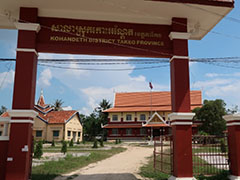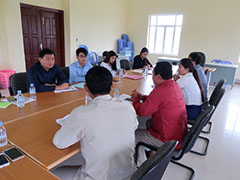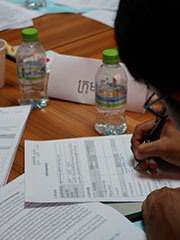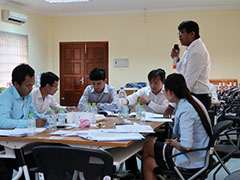Project News
2018-07-06
Field works for case study research
Data collection field works for case study
As part of Training of Trainers (TOT), this project has supported Training Department (TD) to write case studies which can be used on the relevant training courses. As such, preparation of field work to address case study research was conducted in April 2018.
The actual field works that involved gathering relevant data for case studies was conducted during the period as follows;
1) 21st – 24th May, 2018 Takeo Province
2) 4th – 8th June, 2018 Kratie Province
3) 11th – 15th June, 2018 Siem Reap Province
 District Office
District Office
 Interview to a District Governor
Interview to a District Governor
In Takeo province, 8 TD staff who are responsible for case study of Governors' training course which is a part of Advanced Management Course[1] visited the district offices for a field interview survey. An interview survey was conducted with a district governor and deputy governors in 10 districts to gather more and deeper information on a current situation, challenges on (1) Waste management, (2) Public market management, (3) Public service delivery, (4) Tourist resort management, and (5) Personnel management.
In Kratie province, relevant information to develop case studies for Commune/Sangkat Administrative Course was collected. The themes of case study are (1) Civil registration, (2) Public forum, (3) Certificate issue, and (4) Public hygiene and health. In line with the prepared survey questionnaires, a series of interviews survey with the office chief and officials were conducted. The survey results were breaking down to positive and negative aspects to focus on the most important point of each case study.
6 TD staff had visited to Siem Reap to collect information on case studies for the Basic training course for new employees. There are 4 themes of case study, namely (1) Probation and permanent Civil servant, (2) Document management, (3) Transferred function[2] , and (4) Public service delivery. The interview survey was conducted with the governor and the deputy governors, also with local residents to hear actual opinion of the people.
A follow-up meeting
Based on the field research findings, TD staff was working on a case study writing by using the information collected. Subsequently, a follow-up meeting for sharing the draft case studies was convened on 27th June, 2018.
During the follow-up meeting, firstly, Chief Advisor provided key findings through observation of the field works. What's good about this was having smooth interviews and flexible questions, while followings are pointed out that need to be improved;
(1) Some of the Questions were very general or vague to get clear information.
(2) There were only few cases that interviewers elaborated further details or asked more specific information.
The importance of using specific 5W1H method and posing questions with case study awareness that enable the interviewers to obtain precise and in-depth information, was pointed out.
 Filling in the evaluation form
Filling in the evaluation form
 Feedback to the draft case studies
Feedback to the draft case studies
The workshop had moved on to the presentation of the draft case studies. 15 case studies were presented, and a writer of each case study explained the purpose, contents, and questions to the trainees. In response to their case study presentation, participants wrote evaluation feedbacks which examine if case study consistent with the training theme or if the questions are appropriate.
The outcome of workshops and the contents of evaluation forms are used to refine and finalize the case studies.
Note
- [1] Capacity Development Strategy Framework(CDSF) stipulates that the following six obligatory training courses are to be developed and implemented; (1) Advanced Management Course, (2) Management Level Course 2, (3) Management Level Course 1, (4) Specialized Course, (5) Basic Training Course, and (6) Administrative Secretary Course.
- [2] Functions which have been transferred from central to local government
- About JICA
- News & Features
- Countries & Regions
- Our Work
- Thematic Issues
- Types of Assistance
- Partnerships with Other Development Partners
- Climate Change / Environmental and Social Considerations
- Evaluations
- Compliance and Anti-corruption
- Science and Technology Cooperation on Global Issues
- Research
- JICA Development Studies Program / JICA Chair
- Support for the Acceptance of Foreign HRs / Multicultural and Inclusive Community
- Publications
- Investor Relations
